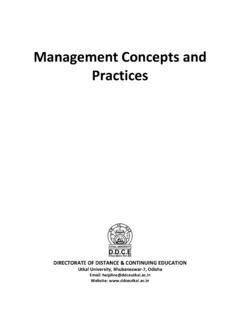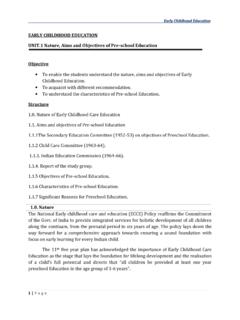Transcription of SOCIO-CULTURAL AND ECONOMIC HISTORY OF MODERN …
1 S1 SOCIO-CULTURAL AND ECONOMIC HISTORY OF MODERN INDIA By Nayak Lecturer in HISTORY SKCG College Paralakhemundi s2 PAPER-22 socio cultural AND ECONOMIC HISTORY OF MODERN INDIA. INTRODUCTION (BLOCK) During the 17th and 18th century, India maintained a favorable balance of trade and had a steady economy .Self-sufficient agriculture, flourishing trade and rich handicraft industries were hallmark of Indian economy. During the last half of the 18thcentury, India was conquered by the East India Company. Along with the consolidation of British political hegemony in India, there followed colonization of its economy and society.
2 Colonization no longer functioned through the crude tools of plunder and tribute and mercantilism but perpetuated through the more disguised and complex mechanism of free trade and foreign capital investment. The characteristic of 19th century colonialism lay in the conversion of India into supplier of foodstuff and raw materials to the metropolis, a market for metropolitan manufacturer, and a field for investment of British capital. In the same way, Indian society in the 19th century was caught in a inhuman web created by religious superstition and social obscuration .Hinduism, has became a compound of magic, animation and superstition and monstrous rites like animal sacrifice and physical torture had replaced the worship of most painful was position of women.
3 The British conquest and dissemination colonial culture and ideology led to introspection about the strength and weakness of indigenous culture and civilization. The paper discusses the socio cultural and ECONOMIC HISTORY of MODERN India. Unit I, discusses attitude and understandings of Orientalist, Utilitarian and Evangelicals towards Indian Society .It further delineates the part played by Christian Missionaries in growth of press and education analyzed in the last section. Unit-11, elaborates social policy and Social change in its section and sub section, it explains role of Ishwar Chandra Vidyasagar in the Women s emancipation movement.
4 Abolition of infanticide and removal of caste rigidity were discussed in the next section. Role of RN Tagore, Prem Chand, Iqbal and Subramanian Bharati were discussed in the last section. s3 Unit 111 explains the Renaissance and socio -religious Reform movements .It discusses the role played by Raja Ram Mohan Ray and Swami Dayananda Saraswati in the socio -religious reform movements. Unit IV, discusses the role played by Ram Krishna Paramahansa and Vivekananda in the social reform movements. In the next section it discusses the role played by Sayyid Ahmed Khan in the Aligrah Movement .In the last section it discusses the part played by Jyotiba Phule in the Aligrah Movement.
5 Unit-1 1 .Objectives Introduction Understanding of the Indian Society (EVANGELICALS) Main Philosophy of Evangelicals Future happiness of India Philosophical Challenge of East India Company Policy toward Indian Christian Obligation towards the Hindus The Charter Act of 1833 The Character At of 1833 Conclusion BRITISHUNDERSTANDING OF INDIAN SOCIETY Main exponents Utilitarian Different view of Utilitarian s4 Utilitarian view on social change Interpretation and Law Views on Land Settlement Views on Government Views on Government Views on Legislation Attitude towards press Relevance of Utilitarian Attitude of Christian Missionary Primary activities Communal Solidarity Social reforms Religious Conversions Social
6 Service Establishment of Orphanage Spread of education Study of Regional Languages Development of Printing and Publication ECONOMIC Development Penetration of Liberal thought Growth of MODERN education Proposal of Wilberforce s5 Proposal of Charls Grant Proposal of Minto Proposal of Elphinston Macaulay system of education Wood s Despath of1854 hunter Commission Report of 1854 The Indian University Act of 1904 Resolution of February1913 The Saddler University Commission1917-19 The Hartog Committees of 1929 Wardha School of education Sergent Plan of education Radhakrishna Commission University Grants Commission Growth of Press Attitude of East India Company Press in Madras Presidency The Censorship of the Press Act 1799 Regulation of 1823 Liberation of Indian Press Licensing Act of 1857 Registration Act of 1867 s6 Vernacular Press Act1878 The News Paper Act of1908 The Indian Press Act 1910 Foerign Relation Act1932 Indian States A( Protection)Act 1934 Press Trust of India Press Law Inquiry Comittees Press (Objectionable matter)
7 Act1957 Press Commission of 1962 Objectives After going through this unit you will be able to Understand the attitude of Evangelicals towards Indian Society Know the objectives of Utilitarian towards Indian Society Know the activities of Christian missionaries during the British Period Know how the MODERN education in India was developed. Know the different phases of growth press in India s7 BRITISH UNDERSTANDTNG OF INDIA SOCTETY (EVANGELI CALS) The main exponents of evangelical were Charles Grant and Wilberforce. Main philosophy of Evangelicals The Evangelicals understood that society could not be changed by legislation, but only by individual honesty. They proposed a campaign to free the Indian mind from the tyranny of evil superstition, a sort of Indian counterpart to the European reformation movement.
8 Their instrument was to be education . Secondly, they propose that though access to Gods revealed word the Indians could be raised out of darkness and idolatry. Future bliss of India The Evangelicals believed that the future prosperity of the British connection and the future happiness of the Indians themselves depended upon complete Anglicization of India society. Let us endeavour to strike our roots in to the soil', said Wilberforce, by the gradual introduction and establishment of our own principles and opinions; of our laws, institutions, and manners; above all as the sources of every other improvement, of our religion, and consequently of our morals Philosophical challenge to East India Company This view represented a real challenge to the East India Company s continuing attitude of non interference.
9 The British in India, though conscious that it depended on the acceptance of the large mass of the people who did not particularly care who governed them as long as their customs and religion were not interfered with. Any attempt to convert Indians to Christianity promised to subvert the very foundation of civil peace by offending the most deeply entrenched religious prejudices. The company s administration had endeavored to maintain a sense of continuity with the s8 past, to emphasize that though it was alien administration, it contemplated no revolutionary changes in the lives of the people. The truth of this was most apparent to Indians in every area attacked by the Evangelicals, namely the Company s religious policy.
10 Policy towards Indian Christians This policy was essentially concerned with not giving offence, and it was taken to such lengths that until 1881, Indian Christians were actively discriminated against by the government. They could not hold appointments in the company s judicial service, nor were they permitted to practice as lawyers in the company s courts. In contrast, the government not only tolerated Hindu and Muslim festivals but allowed troops and military bands to participate in them. In 1802, for example, as a thanks giving for the conclusion of the Treaty of Amiens between Britain and France, an official government party went in procession with troops and military music to the principal shrine of the Hindu goddess Kali in Calcutta and presented the goddess with a substantial sum of money.














